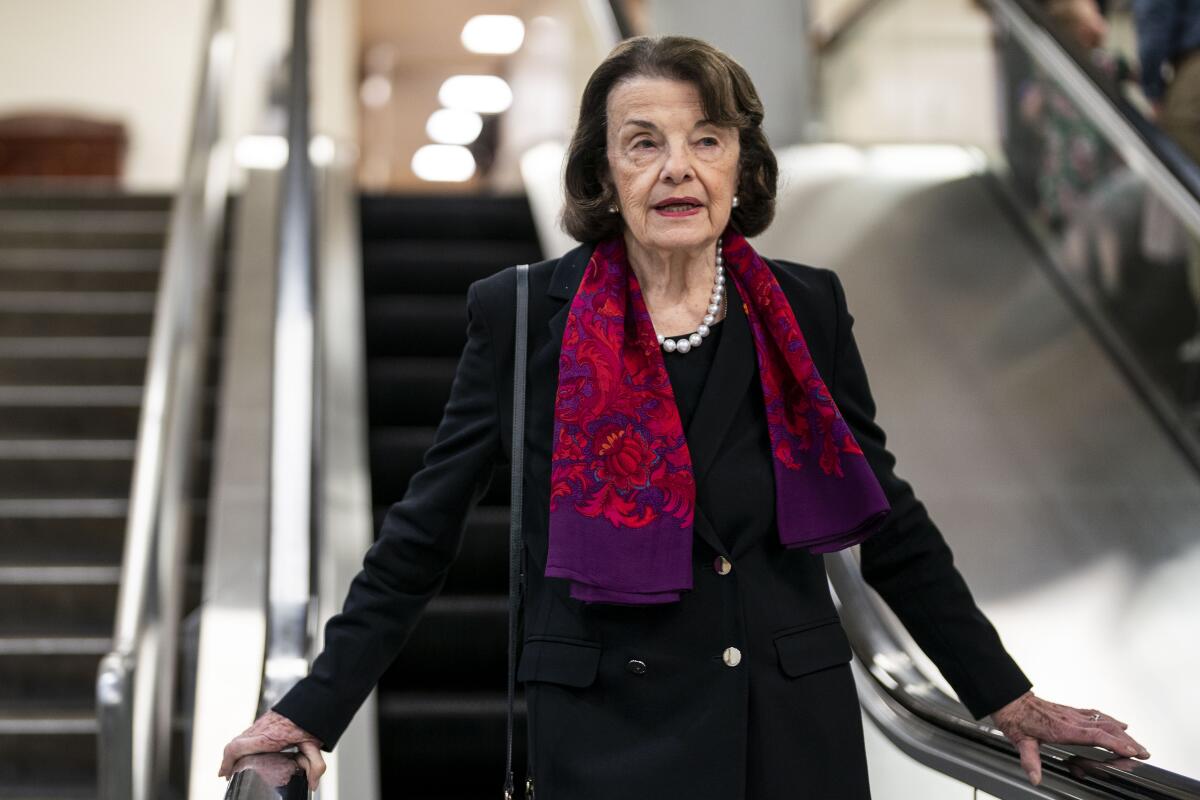White House urges patience as Sen. Feinstein’s absence leaves judicial agenda in jeopardy

WASHINGTON — California Sen. Dianne Feinstein’s health issues are threatening to imperil President Biden’s quest to remake the federal judiciary — but so far the White House is willing to be patient.
“It is her decision to make when it relates to anything about her future,” White House Press Secretary Karine Jean-Pierre told reporters Wednesday. “It is flat wrong to seek partisan advantage from the health issues of a colleague.”
Republicans blocked a Democratic effort on Tuesday to temporarily replace Feinstein on the Senate Judiciary Committee, where the absence of the Democrat’s tie-breaking vote has left some of Biden’s judicial nominees languishing. Senate Majority Leader Charles E. Schumer (D-N.Y.) could bring the matter to a floor vote, but Democrats do not have the 10 Republican votes needed to succeed.
Democrats have few options other than waiting on Feinstein’s return, but when that might be remains unclear as she works from home in San Francisco. The quandary has left Democrats divided on how to deal with the 89-year-old senator’s extended absence, which threatens to derail judicial nominations at a moment when the party’s priorities, including abortion rights, are being challenged in federal courts.
Feinstein hasn’t cast a vote since Feb. 16, and has missed about 60 of the 82 votes held in the upper chamber so far this session. She announced in March that she had been hospitalized with shingles, and said last week that her return to Washington was delayed due to related complications.
A few congressional Democrats, including Rep. Ro Khanna (D-Fremont), have called for Feinstein to step aside. Co-chair of Oakland Democratic Rep. Barbara Lee’s campaign to replace Feinstein, Khanna has been perhaps the most vocal of the group, tweeting last week that “not speaking out undermines our credibility as elected representatives of the people.”
For now, the White House has sided with most Democratic lawmakers, who say Feinstein should be allowed time to decide whether she’s able to serve out the remainder of her term, which ends in 2024. Senate Judiciary Chairman Richard J. Durbin (D-Ill.) said Democrats would try to give Feinstein an opportunity “to return as quickly as possible,” while Schumer said that he had spoken with her last week and that she hoped to return “soon.”
But that sentiment may change depending on the length of Feinstein’s absence and the profound impact it has on the Senate’s ability to pursue the White House’s agenda. Biden has made it a priority to reshape the federal bench, both in the number and diversity of judges.
Democrats have confirmed the president’s judicial nominees at a relatively fast clip, seating 97 judges — including Supreme Court Justice Ketanji Brown Jackson — on the federal bench during Biden’s first two years in office, and confirming 22 more this year. Democrats have sought to outpace the 231 judges, including three Supreme Court justices, whom Senate Republicans confirmed to key judicial vacancies under former President Trump.
Biden is unlikely to top his predecessor, according to Russell Wheeler, a Brookings Institution scholar who follows the judiciary. While Feinstein’s absence has slowed momentum, a dearth of vacancies to be filled will also make it difficult to keep pace with Trump.
“It’s probably too early to get too concerned about the problems created by Feinstein’s absence,” Wheeler said. “The bigger problem is, without a vacancy, nobody’s going anywhere.”
Though Republicans are unwilling to accommodate Feinstein’s request to appoint a temporary replacement in her absence, GOP members of the Senate Judiciary Committee have agreed to move forward with nominees who have bipartisan support, according to a Durbin spokesperson.
Conversations are still ongoing about which nominees would be up for a vote, the spokesperson said, but about 10 are eligible.
There are 15 judicial nominees who have had hearings but are waiting for a committee vote, according to the American Constitution Society, a progressive legal organization. Eighteen judicial nominations have already had a panel vote and can be brought to the Senate floor for a full vote, and some of them could be cleared without Feinstein.
But the episode is not the first Democrats have grappled with in regard to Feinstein, the party’s eldest member and the longest-serving woman in the upper chamber.
In recent years, she has received an increasing number of questions about her cognitive health, and in 2020 she stepped down as the top Democrat on the Judiciary Committee after facing pressure to do so. The most senior member of the Democratic Caucus, she also passed up the role of Senate president pro tempore, which would have placed her third in the line of presidential succession.
Feinstein’s mental fitness and age are a politically sensitive subject for Biden, who at 80 is the nation’s oldest president and has faced questions about whether he should seek another term.
While in the Senate, he recruited Feinstein to the Judiciary panel, and the two former colleagues are longtime friends. She endorsed Biden over Vice President Kamala Harris when the then-junior California senator was running for the Democratic presidential nomination in 2020.
But as the White House and Democrats continue to urge patience with Feinstein’s recovery, speculation has begun about what might happen if she chooses not to return. California Gov. Gavin Newsom has vowed to appoint a Black woman if there’s a Senate vacancy.
Los Angeles Mayor Karen Bass, who spent more than a decade in the House, weighed in on Wednesday during a visit to Capitol Hill.
When asked whether Newsom should stick to his pledge to appoint a Black woman, Bass said: “That’s what he said. He pledged.”
As for Feinstein, Bass said, “I just hope that she gets better soon. And obviously we need her back here so we can get those judges going.”
More to Read
Get the L.A. Times Politics newsletter
Deeply reported insights into legislation, politics and policy from Sacramento, Washington and beyond. In your inbox three times per week.
You may occasionally receive promotional content from the Los Angeles Times.











